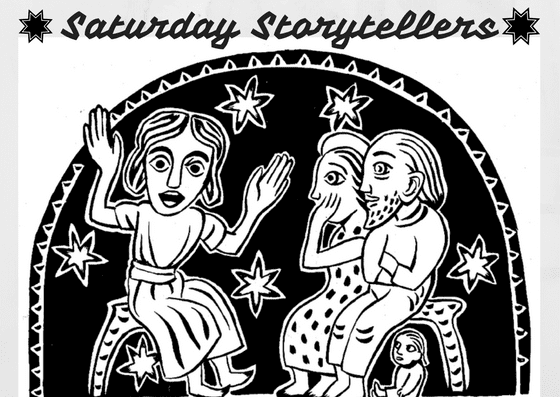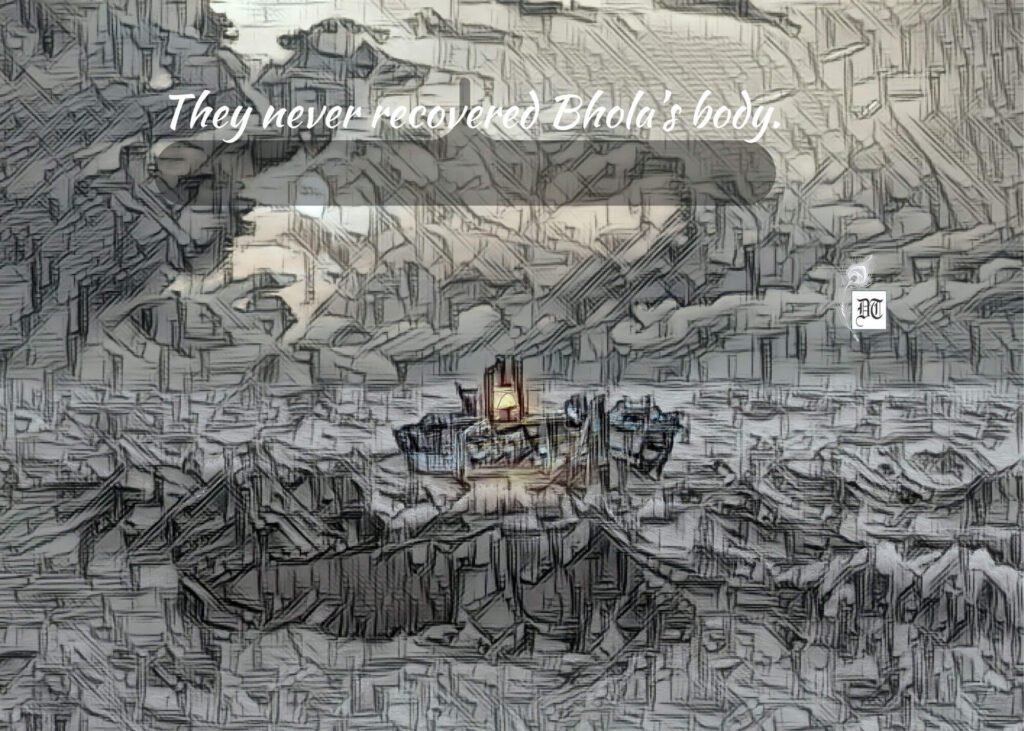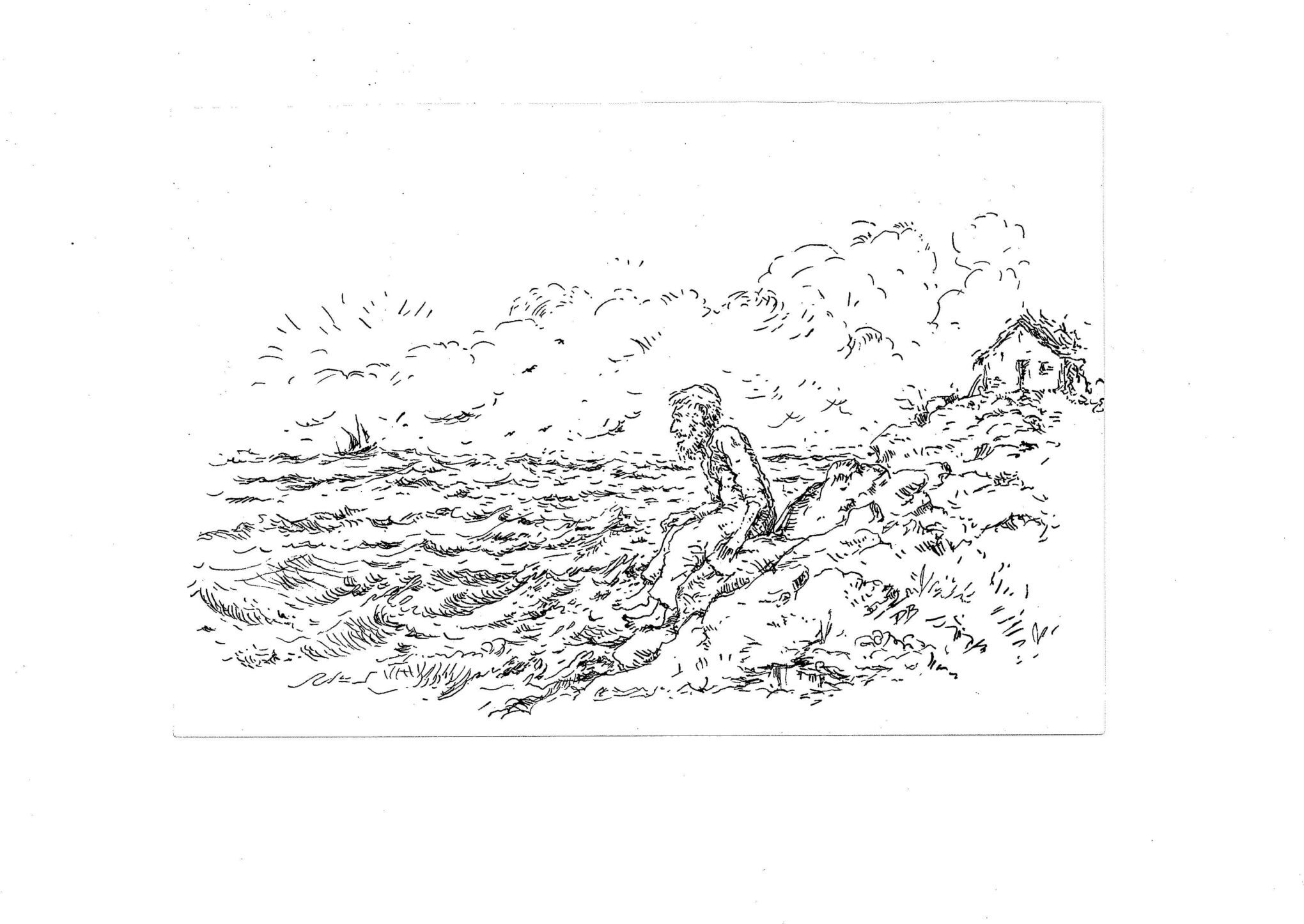Saeed’s story is about a charming man, Bhola, who finds acceptance among the people. He disappeared suddenly. What happened to him? – an exclusive for Different Truths.

They called him Bhola. No one ever knew or bothered to find out what his real name was, but that was the name he was always referred to as, and that was the way it stuck. He was a familiar figure in the neighbourhood as he ambled along on the streets of the locality. On spotting you across the street, he would always hail you with a resonant “Ram, Ram, sahib.” Kuldeep was always a bit embarrassed at being thus singled out in public, and he would often duck for cover and hasten his steps to avoid being seen. But Kuldeep’s self-conscious gesture was unnecessary as Bhola was a well-meaning and harmless old soul. His only motive was to acknowledge and honour Kuldeep with his loud public greeting.
When Kuldeep first met Bhola, he was probably about fifty years of age with a weather-beaten and wizened face that sported a long and straggly grey beard. Dressed in a long black kurta and white ankle-length pyjamas, he wore a white turban around his head with a long shoulder-length tail of cloth trailing behind. He carried a faded black umbrella in one hand. And his feet were shod in a pair of lace-less and worn-out brown shoes. But the redeeming feature in his unusual, if not slightly odd, appearance was his ready smile and twinkling black eyes.
Curious about his antecedents, Kuldeep had once asked him to tell him a little about himself.
Curious about his antecedents, Kuldeep had once asked him to tell him a little about himself. From the bits of information he provided, Kuldeep could piece together that Bhola had been born and brought up in Akola, in the Vidarbha region of Maharashtra. His father had been a cook, and his mother was a housemaid in a wealthy merchant’s house. He had little formal education, and after his parents passed away while he was still a teenage boy, he was absorbed into the household as a kitchen assistant. Not happy with his situation in the merchant’s household, he left after a few years and went to the big city to seek his fortune. But he had fallen on hard times and could not fulfil the dreams he had hoped to achieve.
Despite his aimless wanderings, one could not quite call him a vagrant or tramp, although he did not have a fixed home. He slept in the garage of a large-hearted benefactor whose car he washed each morning and who, in addition to a small monthly wage, also served him a daily breakfast of tea and a loaf of bread. Apart from that, he did odd jobs for the people of the area and relied on the generosity of the neighbourhood homes for the occasional full meal. On festival days or special occasions such as a birth, a marriage, or a birthday, in pursuit of good karma, people would ask him over to their homes and offer him a meal from the food specially prepared for the occasion.
In his younger days, Bhola would stand at the corner where the airport coach stopped to help alighting passengers with their luggage and find them a taxi. He used the tips he earned in this way to supplement his meagre earnings from other odd jobs. But with advancing years and poor health, his wanderings around the street were considerably reduced, and he spent more and more time on the rocks by the seashore. He seemed to have a strange communion with the sea. He would spend hours sitting by the shore gazing out onto the horizon in prayer or quiet meditation. At sunset, he would return to the town, his nightly shelter in the garage, and his car-wash duties the following morning. As the days went by, he began spending more and more time by the sea. In due course, he found a small, abandoned shack on a stretch of shingle beach and even spent the night out by the sea, keeping a small flashlight handy to help him see his way in the dark.
On a Sunday, it was Kuldeep’s fortieth birthday.
On a Sunday, it was Kuldeep’s fortieth birthday. His wife had organised a sumptuous lunch in his honour. All members of his large family of brothers and sisters and their various spouses and offspring had been invited. Before the meal had been laid out, Kuldeep’s mother called out to her son:
“Did you remember to ask Bhola to come today? Only the children have eaten, but I want to serve him before we eat.”
“Yes, Amma, I did ask him to come when I crossed him on the street yesterday,” replied Kuldeep, just as there was a knock at the front door, and Bhola was ushered in.
A large linoleum mat had been put out for Bhola in the pantry room, and a veritable feast was before him. Before commencing his meal, Bhola recited a litany of blessings for the health and well-being of Kuldeep and his family. He was surrounded by the family’s children, including Kuldeep’s two young boys. They sat wide-eyed in a circle around him. For them, Bhola was a curious, fascinating, even slightly comical figure, and they had difficulty suppressing their giggles as Bhola’s head and long flowing beard bobbed up and down as he intoned his blessings. But with all their restraint and self-control, they laughed when the meal ended. Bhola let out a deep and resounding belch to show appreciation for the meal he had just enjoyed.
When the laughter subsided, Kuldeep’s older son cried out:
“Bhola dada, Bhola dada, you must tell us a story!”
He set off on one of his long rambling tales of faraway people and places.
Bhola didn’t need much goading. He set off on one of his long rambling tales of faraway people and places. The children sat spellbound and enthralled around him, and the two littlest girls soon fell fast asleep, curled up on the outspread mat.
A week or so after this happy birthday celebration, people in the town noticed that Bhola could no longer be spotted around in the neighbourhood. That familiar figure with his smiling face and ready greeting were nowhere to be seen. His absence was noticed by the man whose car he washed. He and a few others from the neighbourhood started enquiring about his disappearance. It was only after a month that they found out the facts. They were shocked and dismayed at what they discovered. The vigilance squad had noticed his lone figure sitting by the rocks on the seafront late into the night. They took the intermittent flashes of light emanating from his torch to signal that he was giving out to a smuggling gang bringing in contraband by the sea route.
Two burly men armed with stout sticks approached him one night. “What are you doing out here so late at night? Are you a Bangladeshi refugee?” asked one of the men brusquely.
“Where are your papers? Do you have a birth certificate?” the other enquired gruffly.
Bhola did not know what to say, taken aback by this aggressive intrusion.
Bhola did not know what to say, taken aback by this aggressive intrusion. It was the first time in his life that he had been interrogated in this manner.
“I’m not a refugee,” he blurted out nervously, shaking all over.
“I was born in Akola and moved to the city many years ago. I don’t know what papers you are talking about. There was no birth certificate in those days for us poor people.”
The pair did not seem satisfied. They beat him with their sticks and kicked the poor cringing man. Unmindful of his protests, they dragged him to their waiting vehicle and put him under lock-up.

He was put to untold indignities during his time in the detention centre. His clothes and turban were taken away, and he was put into some form of standardised garb. With his head and long beard shaved off, he was unrecognisable. Humiliated and taunted by his fellow inmates, he became morose and depressed. He showed no interest in the tasteless food served to the detainees. His benefactor, the garage owner, had friends in high places, and, in due course, he was able to secure Bhola’s release. By the time he got out six months later, he had lost so much weight that he had looked gaunt and skeleton-like. Gone were the smile and the twinkle in his eyes, and he walked around like a zombie, not bothering to look at or talk to anyone. The only solace he seemed to find was by the seaside. Despite his horrible experience, he once again spent all his time in the little shack by the sea.
Late one evening, dark clouds started gathering on the horizon.
Late one evening, dark clouds started gathering on the horizon. By nightfall, a mighty storm battered the coast. Gigantic waves rose high above the surface of the sea and swept away the tiny makeshift shack. They never recovered Bhola’s body.
No proof was any longer necessary to ascertain his identity or where he belonged; for the waves had claimed him for their very own.
His final resting place was a watery grave in the ocean’s depths. Perhaps it was all part of his covenant with the sea.
It’s one of the 14 stories from The Missing Tile and Other Stories ~ Editor.
A pen and ink sketch by artist Danesh Bharucha and a picture design by Anumita Roy





 By
By
 By
By
 By
By
 By
By
A poignant reminder of the unnoticed ground reality right under everybody’s eyes.